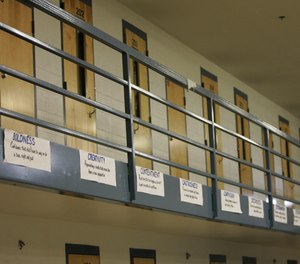By Jessie Christopher Smith
The Oklahoman
OKLAHOMA CITY — Oklahoma Christian University announced Tuesday it's tackling criminal justice reform in its own way with a new degree program aimed at helping incarcerated women better reintegrate into society after prison.
Inmates participating in the degree plan at Mabel Bassett Correctional Center will be working toward an associate of science degree, with an emphasis on business. Up to two courses will be offered each semester, with the goal of completing the degree program in four years.
The program, named the H.O.P.E. (Helping Oklahoma through Prison Education) Institute, is the result of a partnership between OC and the Oklahoma Department of Corrections.

OC's chief academic officer, Jeff McCormack, came up with the degree program after his daughters spoke highly of college courses they took alongside prison inmates in Tennessee.
OC's model, however, is an improvement, with a more expansive scope thanks to federal funding through Pell grants and future plans to provide computers for online optimization of the curriculum.
"These women, when they are able to be released, will have that two-year degree in business, so they could start a business like a dog-grooming school or a hair salon or whatever it may be," McCormack said. "That was really the area of emphasis that the Department of Corrections said we should be focused on."
Mabel Bassett Correctional Center in McLoud is a women's facility. Oklahoma has the highest rate of incarcerated women in the world, with about 151 out of every 100,000 women imprisoned, twice the overall average of the U.S.
Studies show that providing incarcerated individuals access to college education can drastically reduce the chances of their re-entering the prison system.
"It's going to be really exciting to see how this program impacts the families of incarcerated students," McCormack said. "To know that their mom or their grandmother who's in prison is pursuing an education in college — that's going to, I hope, break the cycle for some, where they will say, 'Hey, I need to get an education, too.'"
The degree program is offered free to the inmates and will not incur an expense for the Department of Corrections. In addition to the Pell Grant funding, a private donor is also supporting the H.O.P.E. Institute.
"The Pell Grant funding is not fully scheduled to be opened up to all institutions until 2023, but as far as the students that we enrolled, they filled out their FAFSA, they applied, and they received Pell Grants, so we're really excited," McCormack said.
Fourteen inmates comprised the program's pilot group, which began taking a speech course in August that ended in late November. Phillip Patterson, a mass communications professor at OC, taught the course.
"I have students who have many years left on their sentences," Patterson said. "Out of my 14 students, only two had the opportunity of going to college. Some of them had already come under the jurisdiction of the corrections system by the time of high school graduation, and many of them have had a child amid some unfortunate situations."
Despite these obstacles, Patterson said the inmates who took his course were engaged and transparent, often opening up about their lives in speeches they were trained to give during public speaking sessions. He said he has not encountered such eager students in his 41 years of teaching.
"For a professor, it was like getting a booster shot," Patterson said. "I had nobody that failed to do their homework. Nobody stood up to give a speech that didn't complete the speech, even the ones who were highly communication-apprehensive. They cheered for each other during the speeches and especially afterwards. They just willed the hesitant students through the system, and it was just great to see."
On Friday, program directors visited Mabel Bassett to interview for the next cohort of about 20 students. The pilot group will move on to a composition course in the spring.
McCormack and Patterson said some students from the OC campus will be going to the McLoud facility to take courses along with the inmates, a transformative experience the likes of which McCormack's daughters told him was their favorite course.
"This will change Oklahoma Christian, it'll change our students, it'll change our faculty, it'll change the incarcerated students that are in Mabel Bassett," McCormack said. "And I am convinced that this has the potential, down the road, to change the state of Oklahoma."
Patterson said the program is an investment not just economically, but also spiritually, in redeeming futures and offering second chances.
"It's missional, it's educational, it's grace-filled and all the things you would want," Patterson said. "And it all started because of (McCormack's) daughters' own statements to him."
(c)2021 The Oklahoman
"degree" - Google News
December 05, 2021 at 08:51PM
https://ift.tt/3dnNDda
'Break the cycle': New degree plan offered by Okla. university to incarcerated women - CorrectionsOne
"degree" - Google News
https://ift.tt/2zPqEHn
https://ift.tt/2WkjZfX
Bagikan Berita Ini















0 Response to "'Break the cycle': New degree plan offered by Okla. university to incarcerated women - CorrectionsOne"
Post a Comment